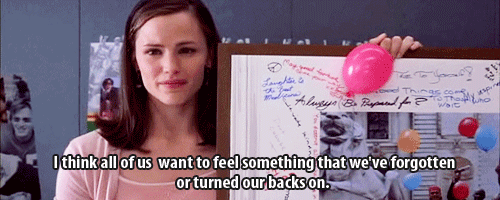In the movie 13 Going On 30 (2004), a young girl named Jenna laments the woes of being a teenager and longs for the day when she’ll be “thirty, flirty, and thriving.” Of course, in typical movie magic style, Jenna is zapped to the future via glittery wishing dust and a birthday party gone bad, skipping right past her late teens and 20s, and Jenna wakes up as a fabulous and well-established 30-year-old with a career in fashion journalism.
Apparently even 13-year-old movie characters aren’t brave enough to wish for early entry into the maze/minefield that is your 20s…

From what I’ve experienced so far, your 20s are an age of mystery, adventure, and confusion. You’re caught between not knowing what you’re doing and needing to keep doing something. You have a drinking license, freshly printed diploma, and possibility, and sometimes that’s all. In the end, being in your 20s means constantly being on the verge of everything, but with a blindfold on–you have no clue where your life is headed but you cannot stop heading there.
In our 20s, we’re in perpetual motion.
It’s no surprise then that we spend (or waste) a lot of time thinking on, worrying about, getting sick over our life journey. We 20-somethings cannot seem to comprehend the idea of just letting life happen or going with the flow until something clicks and the light bulb pops on. As a result, when we finished our degrees and were thrust out of complete academia, we were filled with questions and completely terrified of making choices:
What do we want to do?
Who do we want to be?
Where do we want to go?
Why is the future so hard to see?
Ugh…

If the Doctor can be confused, I reserve the right to be confused too.
We also spend (or waste) a lot of time mourning, bemoaning, raging about the fact that we cannot answer every question and make every choice. We see missed opportunities and feel like life itself now has fewer opportunities. We see others taking different paths and we assume that means we’ve somehow gotten lost in the woods. We see years laid out before us like paving stones and we don’t know where those years will lead us. In short, we fret.
Yet, at the same time that we’re walking about in darkened rooms and worrying about what comes next, being 20-something means experiencing dozens of wonderful people, places, and events.
We’re at the point where we’re entering relationships that just might last beyond coffee and movie dates. We’re learning that our knowledge and skills are valuable to someone somewhere. We’re taking the time to prove to ourselves that the world isn’t flat by leaving our hometowns and zipping around the globe. We’re meeting new people because we want to, not just because they’re in our neighborhood, class, or club.
We’re branching out and carving our own niches in the world, which is pretty freaking amazing.
And, you know what? We’re pretty freaking amazing.



It’s mystery, adventure, and confusion.
We’re mysterious, adventurous, and confused.
We may not know what we’re doing quite yet, but we’re doing something. The path may be untrodden, but we have the chance to forge it ourselves. Life may be a giant jumble of excitement and uncertainty, but we’re trying to figure it out. We may wish for the TARDIS and a smooth jump forward or back, but our 20s are quite fantastic if we just take the time to recognize them for what they are–a decade of freedom and discovery, growth and change (the good kind).
It’s perfectly acceptable not to have our lives completely put together in our 20s. Rome wasn’t built in a day, Harry Potter didn’t defeat Voldemort with one spell, and Frodo couldn’t have made it to Mordor alone–we’ll get there eventually and there is no need to feel down about our youth along the way.
Clichés exist because some ideas are true and common, which is why I don’t feel silly for saying that we would be crazy to waste our 20s worrying and obsessing about what comes next. Life happens regardless of what you decide or do, and we might as well have some fun along the way. In 13 Going On 30 (2004) Jenna skipped over being a 20-something but, in the end, it was that skip, that lost time, those neglected experiences that made Jenna wish she could go back to being a 13-year-old and give growing up another go.

The Doctor isn’t going to schlep us back to 20 when we turn 30, Hermione Granger doesn’t have a time-turner to volunteer, and Doc Brown and Marty McFly aren’t on their way with a tricked out DeLorean time machine.
It’s up to all of us 20-somethings to make the most of our 20s and not turn our back on the experience out of fear for the future. Your 20s are a crazy era but, someday we will look back and say that “a long time ago, in a galaxy far, far away” we were awesome, we did amazing things, and we don’t regret even a single minute of that adventure. Of course, then we’ll brag about our current and future awesome-ness like the millennials we are and get down with our bad selves to infinity and beyond, though that’s another post entirely…
Be your age, live your life, and know that, even if better days are ahead, these days are pretty great too.








